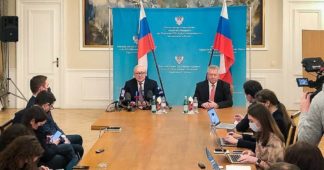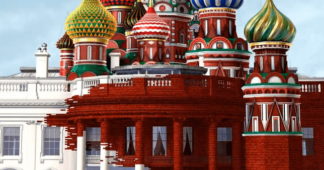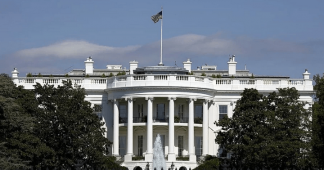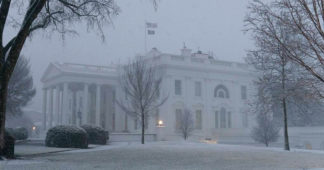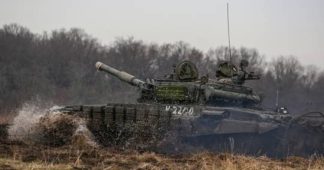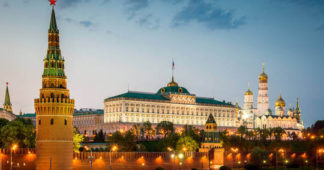By Mike Eckel*
About three hours after the conclusion of the most important European security talks in years, Russia’s deputy foreign minister sat before a thicket of news microphones and offered up a combative postmortem:
Further degradation of the situation with NATO, Aleksandr Grushko said on January 12, will lead to “the most severe and unpredictable consequences for European security.”
Shortly after, he added this:
“Today was a frank conversation.… It was difficult, but frank, but this is already good from the point of view of the situation of European security. I want to emphasize again that we have made the first step forward,” he said. “We look at this very realistically — that is, we don’t have lofty expectations — but we’re pragmatic. If there is a chance to move in the right direction, why wouldn’t you take that chance?”
With around 100,000 Russian troops staged along Ukraine’s border and relations between Moscow and NATO and the United States slipping toward outright conflict, Russian, U.S., and European diplomats tried to stop that slide this week.
It’s not yet clear if they accomplished that. In Washington, the White House national-security adviser had tough new warnings for Moscow; the Kremlin’s spokesman called the talks “unsuccessful.”
At the very least, though, several experts said they appeared to be a baby step in the right direction. Or simply not a step in the wrong direction.
“Something absolutely unbelievable is happening as a result of the Russia-NATO talks,” Tatyana Stanovaya, a Russian political analyst, wrote in a post on Telegram. “NATO rejects Russia’s main demands, but offers to continue the dialogue. Very constructive rhetoric, a sharp decrease in hostility.
“On the Russian side, based on the statements of Grushko, there is an appearance of optimism, a very calm, reassuring mood,” she wrote. “On the one hand, it is obvious that what is happening is a great achievement in itself — a multilateral response to the decades-long accumulation of contradictions.”
To be sure, public statements from Russian officials have been contradictory. Grushko’s colleague, Sergei Ryabkov, said talks were at a “dead end,” telling the Russian channel RTVi: “I don’t see any grounds to sit down in the next few days.”
“We need ironclad, waterproof, bulletproof, legally binding guarantees. Not assurances. Not safeguards. Guarantees,” said Ryabkov, who led the Russian talks in Geneva earlier in the week.
Later, Ryabkov sounded an even more pessimistic note: “Moscow sees no reason for new meetings with the United States and its allies on security proposals,” he was quoted as saying by the TASS news agency on January 13.
At his annual news conference on January 14, Foreign Minister Sergei Lavrov also sounded pessimistic. Still, he said Moscow would wait for a written reaction before deciding how to proceed.
“We expect a written response from our Western colleagues on our proposals,” he said. “We are convinced that, if there is a will to compromise, one can always find mutually acceptable solutions.”
“Russia is waiting for U.S.-NATO reaction and will make up its mind after [it] receives it,” Nikolai Sokov, a former Russian diplomat who is now at the Vienna Center for Disarmament and Nonproliferation, told RFE/RL. “In the meantime, they have to indicate they are ready to keep talking.
“There is a glimpse of hope. Just a glimpse, but at least something,” he said.
Open Door, Closed Door
In Brussels, where Grushko spoke, his remarks were preceded by statements from the NATO secretary-general, Jens Stoltenberg, and the lead U.S. negotiator, Wendy Sherman, the No. 2 official at the U.S. State Department.
Neither minced words, either about NATO’s long-standing “open-door” doctrine or about Western warnings on Russian military forces deployed to regions along Ukraine’s border.
But both also made small signals of the possibility of progress.
“There is plenty to work on, where we have places where we can enhance mutual security,” Sherman told reporters. “There are some places we cannot. But there is progress that can be made.”
“There was no commitment to de-escalation, no,” she said, when asked about Russia’s stance during the talks. “Nor was there a statement that there would not be,” she added after a pause.
If there were any cracks at all in the nearly shut door, it may be because the severity of the situation is keeping officials on both sides from letting it close completely.
“I think the talks achieved more or less the only thing they could achieve, which is that no one stormed out in anger,” said Sam Greene, director of the Russia Institute at King’s College London. “Both sides are sticking to their initial positions, which is unsurprising, given how fundamental both sides’ positions are.
“I have a hard time believing, though, that Moscow seriously thought that a few hours of talks would yield serious concessions from the U.S. and the NATO allies,” he told RFE/RL. “Despite the rhetoric, I think they’re in this for the long haul, and that’s a good thing — because as long as they’re talking, they’re not shooting.”
Europe: Pre-1997
Russia has proposed, with two documents presented as draft treaties, rewriting the entire framework of European security, first erected in the late 1990s, then expanded in the 2000s — mainly through the expansion of NATO.
Given the sweeping nature of the Russian demands, and given the threat of a second Russian invasion of Ukraine, negotiators — Russian and American, above all — are now engaged in higher-level discussions, both at the Kremlin and at the White House, to decide what will follow after Geneva, Brussels, and Vienna.
“It seems difficult to impossible for the Russian leadership to take back the maximalist positions expressed in the two draft treaties,” Sabine Fischer, an expert on Russia at the German Institute for International and Security Studies in Berlin, told RFE/RL. “As a result, the overall situation will remain fragile, particularly along the Russian-Ukrainian border.
“Moscow wants its main counterpart to be the U.S. and not NATO,” she said in e-mailed comments. “Perhaps they hope that a slightly more conciliatory attitude in the talks with Washington will secure a more positive atmosphere and will focus attention and effort on this strand of interaction.”
Russia’s proposals for essentially rolling NATO protections for its newest members back to 1997, and extracting a pledge that the alliance will never admit former Soviet republics like Ukraine and Georgia, were dead on arrival as far as the Americans, and the alliance, were concerned. Russia is also demanding a pledge that NATO not send offensive “strike” weaponry to Ukraine.
“We will not allow anyone to slam closed NATO’s open-door policy, which has always been central to the NATO alliance,” Sherman said.
But Sherman suggested that discussion on things like the deployment of intermediate-range missiles in Europe could be an area for agreement.
In Washington, White House national-security adviser Jake Sullivan mixed new warnings with inducements for Moscow. He said U.S. intelligence had not decided if Russia was committed to a new invasion.
“I’m not going to put myself in the head of the Russians,” Sullivan said on January 13. “As you see from their public comments…they’ve said many different things, some of them contradictory…. Different speakers over the course of this week have given both hopeful signs and deeply pessimistic signs. You’ll have to ask them where they stand in respect to their positioning.
“So as things stand right now, Russia has the opportunity to come to the table,” he said.
This week’s talks were positive in that there was no complete breakdown, said Dmitry Trenin, a longtime Russia expert and head of the Carnegie Moscow Center: no “scandal or final rupture.”
“But it does not now allow for counting on a diplomatic solution to the ongoing crisis in European security,” he wrote.
Any negotiation is about finding “a balance between preferred and acceptable,” Sokov said. “All sides must…accept that they will not get what they wish, no matter how justified they believe their position is. Once you accept that, chances for a positive outcome radically increase.”
Published at www.rferl.org
We remind our readers that publication of articles on our site does not mean that we agree with what is written. Our policy is to publish anything which we consider of interest, so as to assist our readers in forming their opinions. Sometimes we even publish articles with which we totally disagree, since we believe it is important for our readers to be informed on as wide a spectrum of views as possible.

